人教版五年级英语下册各单元知识点(新编)
人教版小学五年级英语下册重点知识归纳

Unit One My day 重点单词: eat breakfast吃早餐 have ⋯ class 上⋯课p lay sports 进行体育运动e xercise 活动,运动d o morning exercises做早操 eatdinner 吃晚饭c lean my room 打扫我的房间go for 啊 walk 散步 go shopping去买东西,购物t ake 学习,上课d ancing舞蹈 ,跳舞 take a dancing class 上舞蹈课w hen 什么时候重点句子 :1. When do you finish class in the morning? 你们上午的课几点结束 ?2. We finish class at 1 o’clock. 我们一点钟结束上午的课.3. What do you do on the weekend?你周末在做什么 ?4. I often watch TV and play ping-pong with my father. 我 ,也常和我爸爸一起球.口语交际: 一 A: When do you finish class in the morning? 你们上午的课 几点结束 ? B: We finish class at 1 o ’clock. Then we eat lunch at home. 一点结束。
然后我们回A: Wow! When do you go back to school after lunch? 午饭后几点到校?B: At 2:30. Classes start at 3 o ’clock. 两点半到校,三点上课。
A: When do you usually eat dinner in Spain? 在西班牙你们通常几点吃晚饭?B: Usually at 9:30 or 10 o ’clock. 通常在九点半或十点。
五年级下册人教版英语校内各单元知识点总结
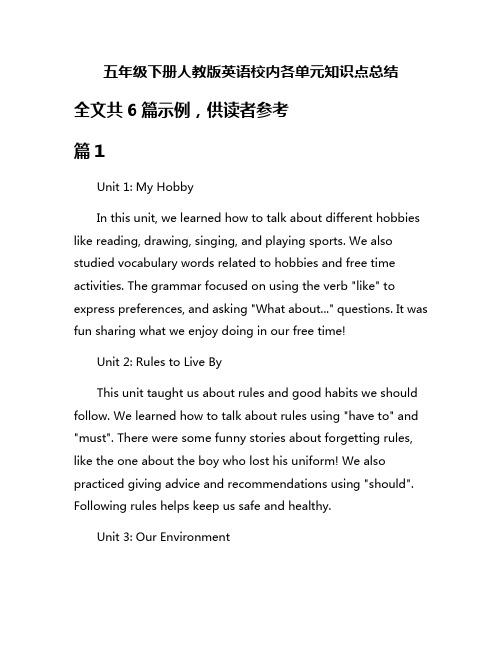
五年级下册人教版英语校内各单元知识点总结全文共6篇示例,供读者参考篇1Unit 1: My HobbyIn this unit, we learned how to talk about different hobbies like reading, drawing, singing, and playing sports. We also studied vocabulary words related to hobbies and free time activities. The grammar focused on using the verb "like" to express preferences, and asking "What about..." questions. It was fun sharing what we enjoy doing in our free time!Unit 2: Rules to Live ByThis unit taught us about rules and good habits we should follow. We learned how to talk about rules using "have to" and "must". There were some funny stories about forgetting rules, like the one about the boy who lost his uniform! We also practiced giving advice and recommendations using "should". Following rules helps keep us safe and healthy.Unit 3: Our EnvironmentProtecting the environment was the main topic here. We studied vocabulary about nature, like names of plants, animals, and habitats. The grammar covered using modal verbs like "can", "may", and "must" to talk about environmental protection. We learned the importance of the 3 R's - reduce, reuse, and recycle! Taking care of our planet is so important.Unit 4: Going PlacesThis fun unit was all about transportation and travel. We learned names of different vehicles and how to ask "How do you go to...?" The grammar focused on using prepositions of motion and the present continuous tense for actions happening now. We did a survey about how classmates get to school. It made us think about transportation choices.Unit 5: Tell Me About ItThe fifth unit helped us describe experiences and past events using the simple past tense. We read stories about field trips, summer vacations, and special occasions like birthdays. The grammar also covered using "when" and time expressions like "ago" or "last year". Now we can share what we did before!Unit 6: Making PlansHere we learned how to make plans and talk about future arrangements. The grammar taught "be going to" for planned actions, and using "can" to make requests or ask for permission. We practiced dialogues for activities like going to the park or joining a sports team. It's useful for discussing what we want to do.Unit 7: It's a Good DealThis unit focused on shopping, money, and prices. We built our vocabulary with words for stores, numbers, clothing items, and more. Practicing dialogs helped us learn polite ways to ask about costs or make purchases. The grammar covered using demonstrative pronouns like "this" and "that". Now we can go shopping easily!Unit 8: All Kinds of WeatherIn the last unit, we explored different types of weather. We read fun poems and did activities to learn weather words like "sunny", "rainy", and "windy". The grammar showed how to talk about the weather using "It's..." sentences. We even made our own meteorologist reports to describe the forecast! Understanding weather helps us dress properly.I hope these summaries are helpful for reviewing what you learned in each unit. Just let me know if you need any clarification or have additional questions!篇2五年级下册人教版英语校内各单元知识点总结Unit 1: My School LifeIn this unit, we learned about our school life and daily routines. We also learned how to express our likes and dislikes. Here are some key points:Words and phrases: subjects, timetable, break time, lunchtime, playground, library, classroom, favorite, like, dislike, etc.Sentences: "I have English on Monday", "I like playing football", "I dislike studying Chinese", etc.Unit 2: My FamilyThis unit was all about our families and relationships. We learned how to describe our family members and talk about their occupations. Here are some important points:Words and phrases: father, mother, sister, brother, grandparents, uncle, aunt, cousin, doctor, teacher, engineer, etc.Sentences: "My mother is a doctor", "I have one brother and one sister", "My cousin is a teacher", etc.Unit 3: Fun TimeIn this unit, we learned about different activities and hobbies that we enjoy during our free time. Here are the key points:Words and phrases: swimming, dancing, painting, playing chess, collecting stamps, listening to music, etc.Sentences: "I like swimming in the summer", "My hobby is painting", "I enjoy listening to music", etc.Unit 4: Our WorldUnit 4 introduced us to different countries, cultures, and languages around the world. Here are the important points:Words and phrases: country, capital, national flag, language, culture, traditional clothes, etc.Sentences: "The capital of China is Beijing", "The national flag of the United States has stars and stripes", "English is spoken in many countries", etc.Unit 5: Healthy HabitsThis unit focused on teaching us about healthy habits and the importance of taking care of our bodies. Here are the key points:Words and phrases: exercise, eat fruits and vegetables, brush teeth, wash hands, get enough sleep, etc.Sentences: "We should exercise regularly", "It's important to eat fruits and vegetables", "Remember to brush your teeth twice a day", etc.Unit 6: Let's CelebrateUnit 6 was all about different celebrations and festivals around the world. Here are the important points:Words and phrases: New Year's Day, Christmas, Halloween, Spring Festival, lantern, costume, gift, etc.Sentences: "People celebrate Christmas on December 25th", "During the Spring Festival, we give red envelopes", "Children wear costumes on Halloween", etc.Unit 7: Our EnvironmentIn this unit, we learned about the environment and the importance of protecting it. Here are the key points:Words and phrases: pollution, recycle, waste, energy, protect, plant trees, etc.Sentences: "We should recycle paper and plastic", "Don't waste water", "We need to protect our environment", etc.Unit 8: Looking BackUnit 8 was a review unit where we had the opportunity to revise and reinforce what we learned throughout the year. We reviewed vocabulary, grammar, and did various exercises.That's the summary of the key points from each unit in the fifth-grade English textbook. Remember to practice using these words and sentences in your daily life to improve your English skills. Keep up the good work, and I'm sure you'll become an excellent English speaker!篇3五年级下册人教版英语校内各单元知识点总结Unit 1: Fun with FriendsIn this unit, we learned how to talk about our friends and their hobbies. We practiced using possessive pronouns like "his" and "her" to describe what our friends have.Unit 2: Our School LifeIn this unit, we talked about our school life and the subjects we study. We learned new vocabulary related to school subjects and daily routines. We also learned how to use adjectives to describe our school and teachers.Unit 3: Outdoor FunIn this unit, we learned about different outdoor activities and how to express our preferences. We practiced using the comparative form of adjectives to compare things. We also learned about different weather conditions and how to talk about them.Unit 4: Our CommunityIn this unit, we talked about our community and the places we can visit. We learned new vocabulary related to community helpers and different locations. We practiced giving and following directions using prepositions like "in," "on," and "next to."Unit 5: Healthy HabitsIn this unit, we learned about the importance of healthy habits and how to describe them. We learned new vocabularyrelated to food, sports, and daily routines. We also practiced using imperatives to give instructions and suggestions.Unit 6: Amazing AnimalsIn this unit, we explored the animal kingdom and learned about different types of animals. We learned new vocabulary related to animals and their habitats. We also practiced using present continuous tense to describe what animals are doing.Unit 7: Festivals and CelebrationsIn this unit, we learned about different festivals and celebrations around the world. We learned new vocabulary related to festivals, traditions, and customs. We also practiced using past tense to talk about past events and celebrations.Unit 8: Protecting the EnvironmentIn this unit, we discussed the importance of protecting the environment and how we can contribute. We learned new vocabulary related to environmental issues and actions we can take. We also practiced using modal verbs like "can" and "should" to express abilities and suggestions.Unit 9: Fun TimeIn this unit, we talked about different leisure activities and how to express our preferences. We learned new vocabulary related to hobbies and free time. We also practiced using "I like" and "I don't like" to talk about our interests.Unit 10: Our WorldIn this unit, we learned about different countries and cultures around the world. We learned new vocabulary related to countries, nationalities, and landmarks. We also practiced using present tense to describe people and places.Remember to review the vocabulary and grammar we learned in each unit. Practicing speaking and listening will help you become more confident in using English. Keep up the good work and enjoy learning English!篇4Five Grade English Knowledge SummaryHello, everyone! Today, I'm going to share with you a summary of the knowledge points in the second semester of the fifth grade English textbook. Let's dive in and have some fun!Unit 1: Seasons and WeatherIn this unit, we learned about different seasons and weather conditions. We know that there are four seasons: spring, summer, autumn, and winter. Each season has its own unique characteristics. For example, spring is warm and flowers bloom everywhere, while winter is cold and it snows.We also learned how to talk about the weather. We use phrases like "It's sunny," "It's cloudy," "It's raining," and "It's snowing" to describe the weather conditions. It's important to pay attention to the weather forecast every day.Unit 2: Hobbies and ActivitiesIn this unit, we talked about our hobbies and activities. Hobbies are the things we like to do in our free time. Some popular hobbies include playing sports, reading books, drawing pictures, and singing songs. We also learned how to ask and answer questions about hobbies, such as "What's your favorite hobby?" and "Do you like playing basketball?"We also learned about different activities we can do, such as swimming, cycling, and playing musical instruments. It's important to have hobbies and activities that we enjoy because they make our lives more interesting and fun!Unit 3: My School DayIn this unit, we learned how to talk about our school day. We learned how to say the time using phrases like "quarter past," "half past," and "quarter to." For example, we say "It's half past seven" to mean 7:30.We also learned the names of different school subjects, such as English, math, science, and art. We talked about our favorite subjects and what we do in each class. It's important to have a good routine and manage our time well at school.Unit 4: Our WorldIn this unit, we explored different countries and cultures. We learned about famous landmarks around the world, such as the Great Wall of China, the Eiffel Tower, and the Statue of Liberty. We also learned about different festivals and celebrations in different countries, such as Chinese New Year and Thanksgiving.We discovered that our world is diverse and filled with interesting things to learn. It's important to respect and appreciate different cultures and traditions.Unit 5: Let's Celebrate!In this unit, we learned about different celebrations and how to express our wishes. We learned phrases like "Happy birthday,""Merry Christmas," and "Happy New Year." We also learned about different customs and traditions during celebrations.We had a lot of fun making greeting cards and decorations for various celebrations. It's important to show our love and care for others during special occasions.Unit 6: Healthy LivingIn this unit, we talked about ways to stay healthy. We learned about the importance of eating a balanced diet, exercising regularly, and getting enough sleep. We also learned about personal hygiene, such as washing hands before meals and brushing teeth twice a day.We had fun learning about healthy food and making healthy snacks. It's important to take care of our bodies and make healthy choices every day.That's all for the summary of the knowledge points in the second semester of the fifth grade English textbook. I hope you enjoyed it and found it helpful. Keep practicing and have a great time learning English!篇5五年级下册人教版英语校内各单元知识点总结嗨!大家好!我是小明,今天我要和大家分享一下五年级下册人教版英语的知识点总结。
完整版)人教版五年级下册英语知识点整理
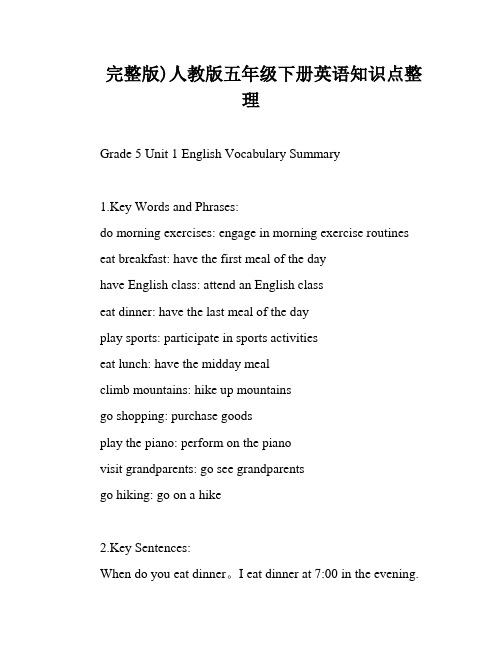
完整版)人教版五年级下册英语知识点整理Grade 5 Unit 1 English Vocabulary Summary1.Key Words and Phrases:do morning exercises: engage in morning exercise routines eat breakfast: have the first meal of the dayhave English class: attend an English classeat dinner: have the last meal of the dayplay sports: participate in sports activitieseat lunch: have the midday mealclimb mountains: hike up mountainsgo shopping: purchase goodsplay the piano: perform on the pianovisit grandparents: go see grandparentsgo hiking: go on a hike2.Key Sentences:When do you eat dinner。
I eat dinner at 7:00 in the evening.When do you get up。
I usually get up at 12:00 at noon.What do you do on the weekend。
Usually。
I watch TV and go shopping。
Sometimes。
I go hiking.I often play football.3.Important Points:Synonyms: eat breakfast - have breakfast。
eat lunch - have lunch。
(完整版)新版PEP五年级英语下册各单元的知识点,推荐文档

Unit 1 My day新版 PEP 五年级英语下册各单元知识点一. 重点词汇。
1. 四会:eat breakfast 吃早饭 have···class 上······课 play sports 进行体育运动 exercise 活动;运动 do morning exercises 做早操 eat dinner 吃晚饭 clean my room 打扫我的房间 go for a walk 散步 go shopping 去买东西; 购物 take 学习;上(课) dancing 跳舞;舞蹈 take a dancing class 上舞蹈课2. 三会: when 什么时候 after 在(时间)后 start 开始 usually 通常地;惯常地 Spain 西班牙 late 晚;迟 a.m.午前;上午 p.m.午后;下午 shop 去买东西;购物 why 为什么 work 工作 sound 听起来好像 also 还;也 last 上一个的;刚过去的 busy 忙的 need 需要 play 戏剧;剧本 letter 信 live 居住 island 岛 win 获胜 always 总是;一直 cave 山洞;洞穴 go swimming 去游泳二. 其他日常活动。
get up 起床eat lunch 吃午饭go to bed 上床睡觉 wash my face 洗脸wash my clothes 洗我的衣服 watch TV 看电视play ping-pong 打乒乓球 play the pipa 弹琵琶 go swimming 去游泳 go running 去跑步 play football 踢足球do homework 做作业play basketball 打篮球do kung fu 练武术三. 频度副词。
新人教版PEP 【小学五年级英语下册】 单元知识点 归纳总结

新人教版PEP 【小学五年级英语下册】单元知识点归纳总结Unit 1 My DayIn this unit。
we learn some core vocabulary words。
phrases。
and XXX.Core Vocabulary:1.Verbs: take (studying)。
go to (class)2.Nouns: dancing。
exercise。
sports3.Phrases: do morning exercises。
eat breakfast。
play sports。
eat dinner。
go for a walk。
go shopping。
clean my room。
take a dancing class。
have a classXXX Vocabulary:1.Verbs: start。
shop。
work。
need。
live。
win。
sound2.Nouns: Spain。
play。
letter。
island。
cave3.ns: after4.XXX: when。
XXX。
a.m。
p.m。
why。
last。
also。
busy5.nal Vocabulary: frequency adverbs (always。
usually。
sometimes)Phrases:watch TV。
eat lunch。
go to bed。
go swimming。
go home。
go to schoolCore Sentence Structure:When do you do morning exercises?" "At 7 o'clock."XXX phrase is "good job" to praise XXX.Which season do you like best。
I like winter best。
This sentence means "which one do you like the most" and "like。
新人教版五年级下册英语知识点汇总
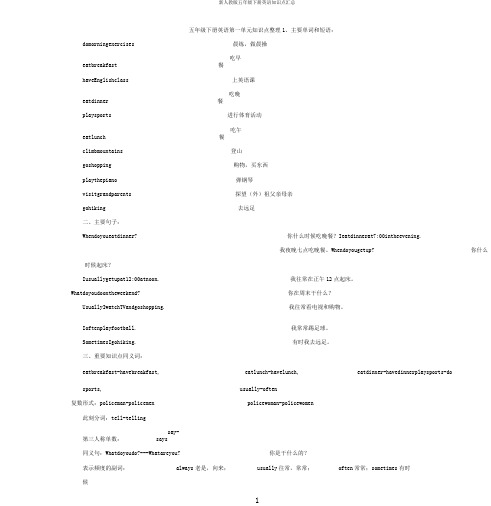
五年级下册英语第一单元知识点整理1、主要单词和短语:domorningexercises晨练,做晨操eatbreakfast吃早餐haveEnglishclass上英语课eatdinner吃晚餐playsports进行体育活动eatlunch吃午餐climbmountains登山goshopping购物,买东西playthepiano弹钢琴visitgrandparents探望(外)祖父亲母亲gohiking去远足二、主要句子:Whendoyoueatdinner?你什么时候吃晚餐?Ieatdinnerat7:00intheevening.我夜晚七点吃晚餐。
Whendoyougetup?你什么时候起床?Iusuallygetupat12:00atnoon.我往常在正午12点起床。
Whatdoyoudoontheweekend?你在周末干什么?UsuallyIwatchTVandgoshopping.我往常看电视和购物。
Ioftenplayfootball.我常常踢足球。
SometimesIgohiking.有时我去远足。
三、重要知识点同义词:eatbreakfast-havebreakfast,eatlunch-havelunch,eatdinner-havedinnerplaysports-dosports,usually-often复数形式:policeman-policemen policewoman-policewomen此刻分词:tell-telling第三人称单数:say-says同义句:Whatdoyoudo?---Whatareyou?你是干什么的?表示频度的副词:always老是,向来;usually往常,常常;often常常;sometimes有时候以复数形式出现的词组:visitgrandparents,planttrees介词后跟表示时间的词语时,表示在某年、某月、某个季节,某个时候(在上午,在下午,在夜晚)用in;表示在某一天,在礼拜几用on,在详细的几点几分用at.too和either的用法差别:too和either都是“也”的意思,但too用于必定句,either用于否认句。
人教版PEP小学英语五年级下册知识点汇总(最新)
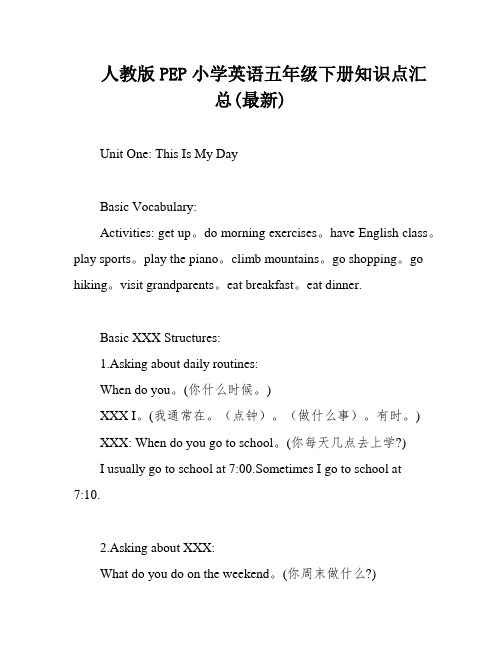
人教版PEP小学英语五年级下册知识点汇总(最新)Unit One: This Is My DayBasic Vocabulary:Activities: get up。
do morning exercises。
have English class。
play sports。
play the piano。
climb mountains。
go shopping。
go hiking。
visit grandparents。
eat breakfast。
eat dinner.Basic XXX Structures:1.Asking about daily routines:When do you。
(你什么时候。
)XXX I。
(我通常在。
(点钟)。
(做什么事)。
有时。
)XXX: When do you go to school。
(你每天几点去上学?)I usually go to school at 7:00.Sometimes I go to school at7:10.2.Asking about XXX:What do you do on the weekend。
(你周末做什么?)XXX I。
(我通常/经常。
有时。
)XXX: What do you do on the weekend?I often play XXX I go shopping with my mom.3.Introducing one's own habits:Every weekend。
I go hiking。
(我每个周末远足。
)Every day。
I do my homework at 8:00 in the evening。
(我每天晚上8点做作业。
)4.Asking XXX:What do you do。
(你是干什么的?)Time:morning。
afternoon。
evening。
noon。
at night。
6:00.on Sunday。
人教版PEP五年级英语下册各单元知识点

PEP五年级英语下册各单元知识点Unit1Myday一、重点词汇。
1.四会词汇:eatbreakfast吃早饭have···class上······课playsports进行体育运动exercise活动;运动domorningexercises做早操eatdinner吃晚饭cleanmyroom打扫我的房间goforawalk散步goshopping去买东西;购物take学习;上(课)dancing跳舞;舞蹈takeadancingclass上舞蹈课2.三会词汇:when什么时候after在(时间)后start开始usually通常地;惯常地Spain西班牙late晚;迟a.m.午前;上午p.m.午后;下午why为什么shop去买东西;购物work工作last上一个的;刚过去的sound听起来好像also还;也busy忙的need需要play戏剧;剧本letter信live居住island岛always总是;一直cave山洞;洞穴goswimming去游泳win获胜二、其他日常活动。
getup起床eatlunch吃午饭gotobed上床睡觉washmyface洗脸washmyclothes洗我的衣服watchTV看电视playping-pong打乒乓球playthepipa弹琵琶goswimming去游泳gorunning去跑步dohomework做作业dokungfu练武术playfootball踢足球playbasketball打篮球三、频度副词。
always总是,一直(100%)usually通常(80%)often经常(60%)sometimes(30%)有时四、疑问词。
when什么时候why为什么五、重点句型。
1、询问别人什么时候做某事的句型及回答。
句型结构:问:Whendoyou+动词短语原形+其他?(你/你们什么时候做某事?)答:I/We(+频度副词)+动词短语原形+at+具体时间(我/我们通常在几点做某事。
新人教版PEP五年级英语下册各单元知识点总结
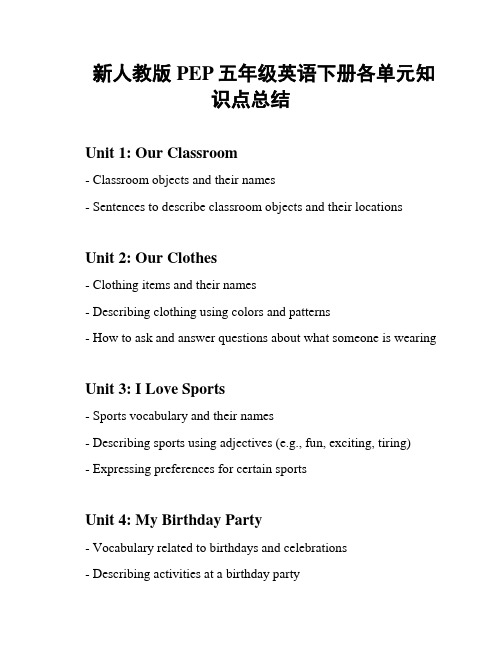
新人教版PEP五年级英语下册各单元知识点总结Unit 1: Our Classroom- Classroom objects and their names- Sentences to describe classroom objects and their locationsUnit 2: Our Clothes- Clothing items and their names- Describing clothing using colors and patterns- How to ask and answer questions about what someone is wearingUnit 3: I Love Sports- Sports vocabulary and their names- Describing sports using adjectives (e.g., fun, exciting, tiring)- Expressing preferences for certain sportsUnit 4: My Birthday Party- Vocabulary related to birthdays and celebrations- Describing activities at a birthday party- Expressing likes and dislikes about different party elementsUnit 5: At the Farm- Vocabulary related to farm animals and their names- Describing farm animals using adjectives (e.g., big, small, noisy) - Describing activities at a farm (e.g., feeding animals, milking cows)Unit 6: A Fun Day Out- Vocabulary related to amusement park rides and activities- Describing activities and experiences at an amusement park- Expressing likes and dislikes about different rides and activitiesUnit 7: A Friendly Letter- Vocabulary related to writing a letter (e.g., greeting, closing, signature)- Structure of a friendly letter- Writing a letter to a friend, describing personal experiences or activitiesUnit 8: Our Pets- Vocabulary related to pets and their names- Describing pets using adjectives (e.g., cute, friendly, playful)- Talking about responsibilities and caring for petsUnit 9: Our Earth- Vocabulary related to the environment and nature- Describing different natural elements (e.g., mountains, rivers, plants)- Expressing concerns and suggesting actions to protect the environmentUnit 10: Fun with Art- Vocabulary related to art and artistic activities- Describing different art forms (e.g., drawing, painting, sculpting) - Talking about personal preferences for different art activitiesUnit 11: Let's Travel- Vocabulary related to travel and transportation- Describing different modes of transportation (e.g., car, train, airplane)- Talking about travel experiences and preferences for different destinationsUnit 12: Healthy Habits- Vocabulary related to health and healthy habits- Describing different healthy habits (e.g., exercise, balanced diet, enough sleep)- Talking about personal choices and habits for a healthy lifestyle。
完整版)人教版PEP五年级英语下册各单元知识点

完整版)人教版PEP五年级英语下册各单元知识点Unit 1 My DayIn this unit。
we will focus on the following vocabulary words:1.Four-word phrases:XXXHave classPlay sportsExerciseMorning exercisesEat XXXClean my roomGo for a walkGo shoppingXXXDancingTake a dancing class2.Three-word phrases: WhenAfterStartUsuallySpainLateAMPMWhyShopWorkLastSoundAlsoBusyNeedPlayXXXLiveIslandAlwaysCaveGo swimmingXXXXXX words。
we will also cover other daily XXX up。
eating lunch。
and going to bed。
We will also learn how to wash our face and clothes。
watch TV。
play ping-pong and the pipa。
go swimming and running。
do homework and kung fu。
and play XXX.We will also learn about frequency adverbs。
including always。
usually。
often。
and sometimes。
Finally。
we will cover the n words when and why。
and XXX we do certain activities.One XXX structure we will learn is how to ask someone when they do something and how to answer。
人教版五年级英语下册全册知识点总结
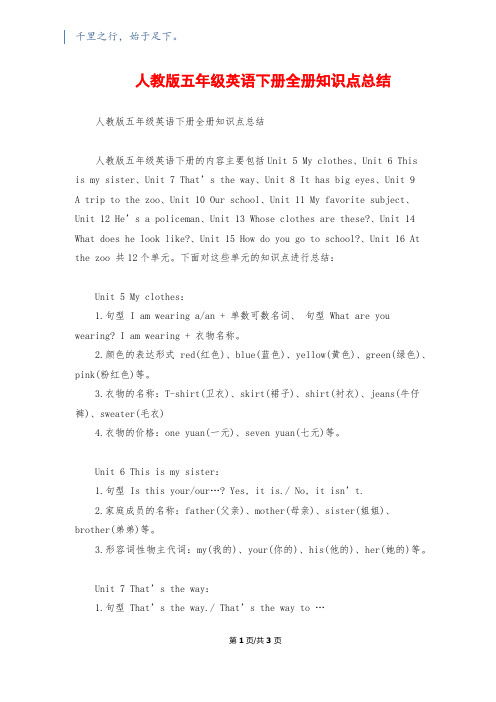
千里之行,始于足下。
人教版五年级英语下册全册知识点总结人教版五年级英语下册全册知识点总结人教版五年级英语下册的内容主要包括Unit 5 My clothes、Unit 6 This is my sister、Unit 7 That’s the way、Unit 8 It has big eyes、Unit 9A trip to the zoo、Unit 10 Our school、Unit 11 My favorite subject、Unit 12 He’s a policeman、Unit 13 Whose clothes are these?、Unit 14 What does he look like?、Unit 15 How do you go to school?、Unit 16 At the zoo 共12个单元。
下面对这些单元的知识点进行总结:Unit 5 My clothes:1.句型 I am wearing a/an + 单数可数名词、句型 What are you wearing? I am wearing + 衣物名称。
2.颜色的表达形式 red(红色)、blue(蓝色)、yellow(黄色)、green(绿色)、pink(粉红色)等。
3.衣物的名称:T-shirt(卫衣)、skirt(裙子)、shirt(衬衣)、jeans(牛仔裤)、sweater(毛衣)4.衣物的价格:one yuan(一元)、seven yuan(七元)等。
Unit 6 This is my sister:1.句型 Is this your/our…? Yes, it is./ No, it isn’t.2.家庭成员的名称:father(父亲)、mother(母亲)、sister(姐姐)、brother(弟弟)等。
3.形容词性物主代词:my(我的)、your(你的)、his(他的)、her(她的)等。
人教部编版小学五年级英语下册第三单元知识点归纳与整理

人教部编版小学五年级英语下册第三单元知识点归纳与整理本文档旨在整理和归纳人教部编版小学五年级英语下册第三单元的知识点。
以下是对该单元的知识点的简要总结:1. 动词的过去式:单词的过去式形式变化规则,例如:- 动词+ed:walked, played- 以不发音的e结尾的动词,直接加d:liked, danced- 以辅音字母加y结尾的动词,变y为i,再加ed:studied, cried2. 过去式的用法:表达过去发生的动作或状态,例如:- I walked to the park yesterday.- He played soccer with his friends last weekend.3. 过去式的否定形式:在动词前加助动词did和not,例如:- I did not walk to school yesterday.- She did not play the piano last night.4. 过去式的疑问形式:将助动词did提到句首,例如:- Did you eat breakfast this morning?- Did they watch a movie last night?5. 过去式的简略回答:根据问题,使用Yes, I did. / No, I didn't. 来回答,例如:- Did you go shopping? - Yes, I did. / No, I didn't.6. 过去式的时间状语词:用于修饰过去式动作发生的具体时间,例如:- yesterday, last week, two days ago以上就是人教部编版小学五年级英语下册第三单元的知识点归纳与整理。
希望对您有所帮助!---请注意,以上归纳和总结仅供参考,可能不包含所有的知识点。
建议您在学习时结合教材和老师的指导,全面掌握相关知识。
人教版五年级英语下册全册知识点总结
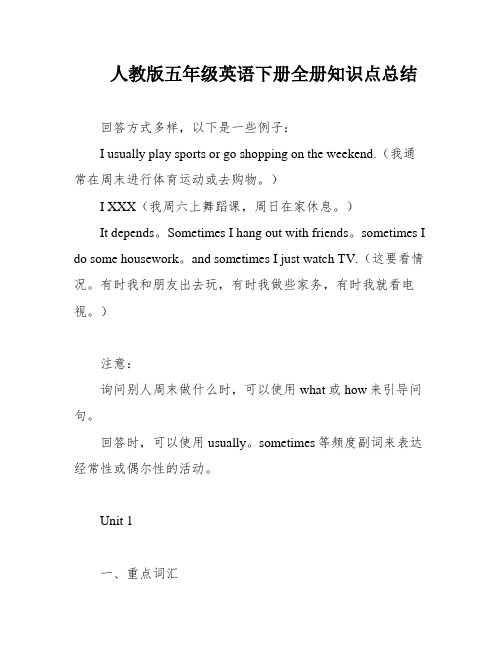
人教版五年级英语下册全册知识点总结回答方式多样,以下是一些例子:I usually play sports or go shopping on the weekend.(我通常在周末进行体育运动或去购物。
)I XXX(我周六上舞蹈课,周日在家休息。
)It depends。
Sometimes I hang out with friends。
sometimes I do some housework。
and sometimes I just watch TV.(这要看情况。
有时我和朋友出去玩,有时我做些家务,有时我就看电视。
)注意:询问别人周末做什么时,可以使用what或how来引导问句。
回答时,可以使用usually。
sometimes等频度副词来表达经常性或偶尔性的活动。
Unit 1一、重点词汇吃早餐:eat breakfast 上······课:have。
class进行体育运动:play sports做早操:do morning exercises 打扫我的房间:clean my room 去购物:go shopping舞蹈:dancing上午:a.m.通常地:usually二、其他日常活动起床:get up上床睡觉:go to bed活动,运动:exercise吃晚饭:eat XXX散步:go for a walk研究,上(课):XXX上舞蹈课:take a dancing class下午:p.m.吃午饭:eat XXX洗脸:XXX洗我的衣服:XXX看电视:watch TV打乒乓球:play ping-pong弹琵琶:play the pipa去游泳:go swimming去跑步:go running做作业:do homework练武术:do XXX踢足球:play football打篮球:play basketball三、语音cl→ [cl]:clean。
新版PEP人教版小学五年级英语下册各单元知识点汇总(全套)

新版PEP五年级英语下册各单元知识点一. 重点词汇。
1. 四会:eat breakfast吃早饭have···class 上······课play sports 进行体育运动exercise 活动;运动do morning exercises做早操eat dinner吃晚饭clean my room 打扫我的房间go for a walk 散步go shopping 去买东西;购物take学习;上(课)dancing 跳舞;舞蹈take a dancing class 上舞蹈课2. 三会:when什么时候after在(时间)后start开始usually通常地;惯常地Spain西班牙late晚;迟 a.m.午前;上午p.m.午后;下午shop去买东西;购物why为什么work工作sound听起来好像also还;也last上一个的;刚过去的busy忙的need需要play戏剧;剧本letter信live居住island岛win获胜always总是;一直cave山洞;洞穴go swimming去游泳二. 其他日常活动。
get up起床eat lunch吃午饭go to bed 上床睡觉wash my face洗脸wash my clothes 洗我的衣服watch TV看电视play ping-pong打乒乓球play the pipa弹琵琶go swimming 去游泳go running去跑步do homework 做作业do kung fu练武术play football踢足球play basketball打篮球三. 频度副词。
always总是,一直(100%)usually通常(80%)often 经常(60%)sometimes有时(30%)四. 重点句型。
1. 询问别人什么时候做某事的句型及回答。
句型结构:问:When do you+动词短语原形+其他?(你/你们什么时候做某事?)答:I/We(+频度副词)+动词短语原形+at+具体时间(我/我们通常在几点做某事。
最新PEP人教版小学英语五年级下册单元知识清单总结(全册)
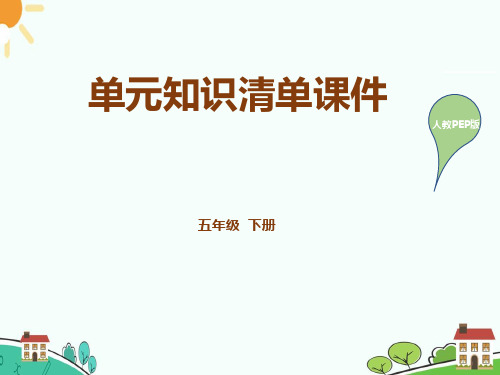
五、第八、第九、 第十二变化不规则外,其 余均在基数词后加上-th即可。 ② 20~90的序数词的构成方法是将基数词的词 尾 -y 变成i再加-eth. ③ 几十几的序数词,只需把个位数变成序数词, 十位数不变。
英语 人教PEP版 五年级下册 Unit 1
英语 人教PEP版 五年级下册 Unit 1
例如: —When does he do sports?
他什么时候做运动? —He usually plays sports after school.
他通常放学后做运动。 ☆询问时间的其他句型: What time+do/does+主语+动词原形+其他? 例如:What time do you read English?
单元知识清单课件
人教PEP版
五年级 下册
英语 人教PEP版 五年级下册 Unit 1
Unit 1 单元重难点
1.【原文呈现】 When do you finish class in the morning? 你们上午的课到几点结束? 【句型结构】 “When+助动词+sb+动词原形+其他?” 用来询问某(些)人做某事的时间。
—I usually climb mountains. 我通常爬山。
英语 人教PEP版 五年级下册 Unit 1
【情景再现】 每个人都有自己的周末安排。来看一下Mike和
Amy的周末计划吧! Mike:Hello, Amy! What do you do on the weekend? Amy:I usually play the piano. Mike:Oh, that’s good. When do you usually play
人教版小学英语五年级下册各单元知识点

人教版小学英语五年级下册各单元知识点Unit 1: My dayIn this unit, students learn to talk about their daily routines and the time in English. They also learn to express their likes and dislikes about different activities.Some of the key vocabulary words and phrases include:- Get up- Have breakfast- Go to school- Have lunch- Have dinner- Watch TV- Play games- Read books- Do homework- Brush teeth- Go to bedStudents are introduced to the verb "to be" and learn how to make simple sentences with it, such as "I am happy" or "He is tired". They also practice asking and answering questions using "what", "when", and "where".Unit 2: Colors and clothesIn this unit, students learn to identify and name colors, clothing items, and accessories in English. They also learn to describe their own clothing and what they are wearing.Some of the key vocabulary words and phrases include:- Red- Blue- Green- Yellow- Orange- Purple- Pink- White- Black- T-shirt- Dress- Pants- Skirt- Shoes- Socks- Hat- Bag- SunglassesStudents learn about the use of prepositions such as "on", "in", and "under" to describe clothing and daily routines. They also practice using adjectives to describe colors and clothing, and learn to ask and answer questions such as "What color is your shirt?" and "What are you wearing today?"Unit 3: Food and drinksIn this unit, students learn to talk about different types of food and drinks in English. They also learn about healthy eating habits and meal times.Some of the key vocabulary words and phrases include:- Pizza- Sandwich- Rice- Noodles- Salad- Fruit- Vegetables- Juice- Milk- Water- Breakfast- Lunch- Dinner- SnackStudents learn about the use of countable and uncountable nouns when talking about food and drinks. They also practice using the articles "a", "an", and "the" correctly. They learn to express likes and dislikes about different foods and drinks using the verb "to like" and "to dislike".Unit 4: Holidays and festivalsIn this unit, students learn about different holidays and festivals celebrated around the world. They learn to talk about the traditions, customs, and symbols associated with these celebrations.Some of the key vocabulary words and phrases include:- Christmas- Easter- Halloween- New Year- Valentine's Day- Thanksgiving- Dragon Boat Festival- Mid-Autumn Festival- Lantern Festival- Traditions- Customs- Symbols- FireworksStudents learn to ask and answer questions about holidays and festivals. They learn to use vocabulary related to greetings, gifts, and decorations. They also practice using the verb "to celebrate" to talk about different celebrations.Unit 5: Animals and petsIn this unit, students learn about different types of animals and pets. They learn to describe their appearance, behavior, and habitat. Some of the key vocabulary words and phrases include:- Dog- Cat- Fish- Bird- Rabbit- Hamster- Snake- Monkey- Elephant- Tiger- Giraffe- Zoo- Forest- Sea- SkyStudents learn to use adjectives to describe animals, such as "cute", "fierce", or "big". They practice asking and answering questions about pets and their owners, and learn about basic pet care and responsibilities.Unit 6: Weather and seasonsIn this unit, students learn to talk about different types of weather and the four seasons. They learn to express their preferences and activities associated with each season.Some of the key vocabulary words and phrases include:- Sunny- Cloudy- Rainy- Snowy- Windy- Spring- Summer- Fall/Autumn- Winter- Sun- Rain- Snow- Leaves- FlowersStudents learn to use verbs to describe weather and activities, such as "to swim" or "to play snowballs". They also practice using simple present tense to make statements and ask questions. They learn to use adjectives to describe weather, such as "beautiful", "hot", or "cold".Unit 1: My dayIn this unit, students will be introduced to the basic vocabulary and phrases related to their daily routines and the time.The teacher can start by asking students when they usually wake up, and elicit the verb "to get up". Then, the class can work on making sentences like "I get up at 7 o'clock in the morning" or "He gets up early". The teacher can also introduce basic adverbs of frequency, such as "always", "usually", "sometimes", and "never".The class can then move on to discussing meals, such as breakfast, lunch, and dinner. Students can practice using the verb "to have" to describe what they eat and drink, such as "I have cereal and milk for breakfast" or "She has a sandwich for lunch". They can also learn to talk about their favorite foods and drinks, and use expressions like "I like" or "I don't like".The teacher can also introduce basic verbs related to daily activities, such as "to go", "to come", "to watch", "to play", "to read", and "to do". Students can learn to make sentences like "I go to school by bus" or "He plays games after school". The teacher can also teach prepositions of place, such as "at", "in", and "on", todescribe daily routines in more detail.Finally, the class can practice telling time in English, using both the 12-hour and 24-hour clock formats. Students can work on making sentences such as "It's 7 o'clock" or "It's half past nine". Unit 2: Colors and clothesIn this unit, students will learn to identify and name different colors, clothing items, and accessories.The teacher can start by introducing basic colors, such as red, blue, green, yellow, and so on. Students can practice using colors to describe different objects, such as "a red car" or "a blue shirt". The class can also work on making sentences like "I like wearing green clothes" or "She has a pink bag".Next, the teacher can introduce different types of clothing, such as T-shirts, dresses, pants, skirts, shoes, socks, hats, and bags. The class can learn to use prepositions of place to describe clothing, such as "on", "in", or "under". For example, "I wear my T-shirt under my jacket" or "She puts her shoes in the closet".The class can also learn about different accessories, such as sunglasses, watches, and jewelry. Students can practice using vocabulary to describe accessories, and make sentences like "He wears a watch on his wrist" or "She likes wearing earrings". Finally, the teacher can introduce the concept of describing what someone is wearing. The class can practice using adjectives to describe clothing, such as "casual", "formal", or "fancy". They canalso practice asking and answering questions about each other's outfits, such as "What are you wearing today?" or "Do you like my shirt?"Unit 3: Food and drinksIn this unit, students will learn about different types of food and drinks, and healthy eating habits.The teacher can start by introducing basic food vocabulary, such as pizza, sandwich, noodles, salad, fruit, and vegetables. Students can practice using the verb "to have" to describe what they eat and drink, and learn to make sentences like "I have a banana for breakfast" or "She has a salad for lunch".The class can also learn about different types of drinks, such as juice, milk, and water. They can practice using vocabulary to describe drinks and make sentences like "He drinks orange juice in the morning" or "She likes drinking milk before bed".Next, the teacher can introduce vocabulary related to meal times, such as breakfast, lunch, dinner, and snack. The class can learn to use the correct articles "a", "an", and "the" when talking about food and drink, and practice making sentences like "I have an apple for a snack" or "We eat dinner at 6 o'clock".Finally, the class can learn about healthy eating habits, such as eating fruits and vegetables, and drinking enough water. They can practice expressing likes and dislikes about different foods and drinks using the verbs "to like" and "to dislike", and learn to make sentences like "I like apples but I dislike broccoli".Unit 4: Holidays and festivalsIn this unit, students will learn about different holidays and festivals celebrated around the world.The teacher can start by asking students if they celebrate any special holidays or festivals, and elicit different types of celebrations. Then, the class can learn about some of the most common holidays and festivals, such as Christmas, Easter, and Halloween, and discuss their traditions and customs.Next, the class can learn about different traditions and symbols associated with holidays and festivals from different cultures. For example, they can learn about the dragon boat festival in China, the mid-autumn festival in Vietnam, and the lantern festival in Japan.The teacher can also introduce vocabulary related to greetings, gifts, and decorations. Students can practice making sentences like "I gave my mom a card for Mother's Day" or "We decorate the Christmas tree with ornaments". The class can also practice using the verb "to celebrate" to talk about different celebrations.Finally, the class can learn about how holidays and festivals are celebrated in different countries and cultures. They can learn about different foods, costumes, and activities associated with each celebration.Unit 5: Animals and petsIn this unit, students will learn about different types of animals andpets.The teacher can start by asking students what animals they like or dislike, and elicit different types of animals. Then, the class can learn to identify and name different animals, such as dogs, cats, fish, birds, and so on.Next, the class can learn about different types of pets, such as dogs, cats, hamsters, and rabbits. They can practice using vocabulary to describe pets and make sentences like "I have a dog named Max" or "She likes to play with her cat".The teacher can also introduce vocabulary related to animal behavior, such as "cute", "fierce", or "friendly". The class can learn to use adjectives to describe animals, and practice making sentences like "The tiger is fierce but the bunny is cute".Finally, the class can learn about basic pet care and responsibilities. They can learn about feeding, grooming, and playing with pets, and practice making sentences like "I walk my dog every evening" or "She cleans her fish tank every week".Unit 6: Weather and seasonsIn this unit, students will learn to talk about different types of weather and the four seasons.The teacher can start by asking students what their favorite season is, and elicit different types of seasons. Then, the class can learn to identify and name different types of weather, such as sunny, cloudy, rainy, and snowy.Next, the class can learn about the different activities and events associated with each season. For example, they can learn about swimming and camping in the summer, apple picking and Halloween in the fall, skiing and ice skating in the winter, and gardening and Easter in the spring.The teacher can also introduce basic verbs related to weather and activities, such as "to swim", "to play", or "to ski". Students can practice making sentences like "I swim in the lake on hot days" or "She skis with her family in the winter".Finally, the class can learn to express their preferences and dislikes about each season, using expressions like "I love spring because of the flowers" or "I don't like winter because it's too cold". They can learn to use adjectives to describe weather, such as "beautiful", "hot", or "cold", and practice asking and answering questions using simple present tense.。
【人教pep版】五年级下册英语 第1-6单元知识点梳理大全

第一单元:一、重点词汇。
eat breakfast吃早餐have·c lass上··课play sports进行体育运动exercise活动,运动。
do morning exercises早锻炼eat dinner吃晚饭clean my room打扫我的房间go for a walk散步go shopping去购物take学习,上(课)dancing舞蹈take a dancing class上舞蹈课a.m上午p.m.下午usually通常地一、其他日常活动。
get up起床eat lunch吃午饭go to bed上床睡觉wash my face洗脸wash my clothes洗我的衣服watch TV看电视play ping-pong打乒乓球play the pipa弹琵琶go swimming去游泳go running去跑步do homework做作业do kung fu练武术play football踢足球play basketball打篮球二、频度副词。
always总是,一直(100%)usually通常(80%)often经常(60%)sometimes (30%)有时三、疑问词。
when什么时候why为什么四、重点句型。
1、询问别人什么时候做某事的句型及回答。
句型结构:问:When do you+动词短语原形+其他?(你/你们什么时候做某事?)答:I/we(+频度副词)+动词短语原形+at+具体时间(我/我们通常在几点做某事。
)例:问:When do you go to bed?(你什么时候上床睡觉?)答:I go to bed at9:00p.m(我晚上9点上床睡觉。
)注意:当主语是第三人称单数(he,she,it,单个人名或单数名词)时,助动词do要变成does,句型结构是:whendoes+主语(第三人称单数)+动词短语原形+其他?2、询问别人周末做什么的句型及回答。
新人教版小学英语五年级下册1-2单元知识点复习
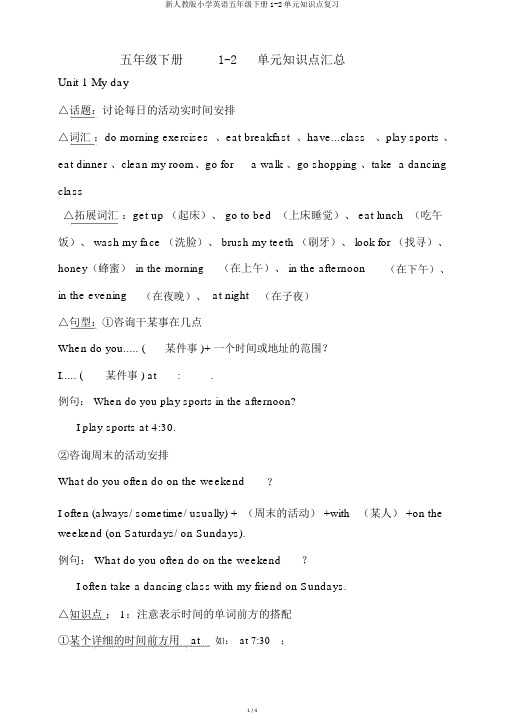
五年级下册1-2 单元知识点汇总Unit 1 My day△话题:讨论每日的活动实时间安排△词汇:do morning exercises 、eat breakfast 、have...class 、play sports 、eat dinner 、clean my room、go for a walk 、go shopping 、take a dancing class△拓展词汇:get up (起床)、 go to bed (上床睡觉)、 eat lunch (吃午饭)、 wash my face (洗脸)、 brush my teeth (刷牙)、 look for (找寻)、honey(蜂蜜)in the morning (在上午)、 in the afternoon (在下午)、in the evening (在夜晚)、at night (在子夜)△句型:①咨询干某事在几点When do you..... ( 某件事 )+ 一个时间或地址的范围?I..... ( 某件事 ) at ___:_____.例句: When do you play sports in the afternoon?I play sports at 4:30.②咨询周末的活动安排What do you often do on the weekendI often (always/ sometime/ usually) +(周末的活动) +with (某人) +on the weekend (on Saturdays/ on Sundays).例句: What do you often do on the weekend?I often take a dancing class with my friend on Sundays.△知识点: 1:注意表示时间的单词前方的搭配①某个详细的时间前方用at如:at 7:30;②在周末 weekend的前方则用 on 而且加 the 如: on the weekend ;但在礼拜几前方用on 而且不加 the 如: on Saturday ;③在 morning 、afternoon 、evening 前方用 in ,而且加 the 如:in the morning ;④在 night前方用at如:at night。
- 1、下载文档前请自行甄别文档内容的完整性,平台不提供额外的编辑、内容补充、找答案等附加服务。
- 2、"仅部分预览"的文档,不可在线预览部分如存在完整性等问题,可反馈申请退款(可完整预览的文档不适用该条件!)。
- 3、如文档侵犯您的权益,请联系客服反馈,我们会尽快为您处理(人工客服工作时间:9:00-18:30)。
五年级英语下册各单元知识点Unit 1 My day一、重点词汇。
1.四会词汇:eat breakfast吃早饭 have···class 上······课 play sports 进行体育运动exercise 活动;运动 domorning exercises做早操 eat dinner吃晚饭clean my room 打扫我的房间 go for a walk 散步 go shopping 去买东西;购物take学习;上(课) dancing跳舞;舞蹈 take a dancing class 上舞蹈课2. 三会词汇:when什么时候after 在(时间)后start 开始usually 通常地;惯常地Spain 西班牙late 晚;迟 a.m. 午前;上午 p.m. 午后;下午 why 为什么shop 去买东西;购物work 工作last 上一个的;刚过去的sound 听起来好像 also 还;也 busy 忙的 need 需要 play 戏剧;剧本letter 信live 居住island 岛always 总是;一直cave 山洞;洞穴go swimming 去游泳 win 获胜二、其他日常活动。
get up起床 eat lunch吃午饭 go to bed 上床睡觉wash my face洗脸 wash my clothes 洗我的衣服 watch TV看电视play ping-pong打乒乓球 playthe pipa弹琵琶 go swimming去游泳go running去跑步 do homework 做作业 do kung fu练武术play football踢足球 play basketball打篮球三、频度副词。
always总是,一直(100%) usually通常(80%) often 经常(60%) sometimes (30%)有时四、疑问词。
when什么时候 why 为什么五、重点句型。
1、询问别人什么时候做某事的句型及回答。
句型结构:问:When do you+动词短语原形+其他?(你/你们什么时候做某事?)答:I/We(+频度副词)+动词短语原形+at+具体时间(我/我们通常在几点做某事。
)例:问:When do you go to bed?(你什么时候上床睡觉?)答:I go to bed at 9:00p.m (我晚上9点上床睡觉。
)注意:当主语是第三人称单数(he,she,it,单个人名或单数名词)时,助动词do要变成does,句型结构是:When does+主语(第三人称单数)+动词短语原形+其他?2、询问别人周末做什么的句型及回答。
句型结构:问:What do you do on theweekend?(你周末做什么?)答:I(+频度副词)+动词(短语)+其他。
例:问:What do you do on theweekend?(你周末做什么?)答:I usually read books. (我通常看书。
)注意:当主语是第三人称单数(he,she,it,单个人名或单数名词)时,助动词do要变成does,句型结构是:What does+主语(第三人称单数)+do+on the weekend?六、四会句子:When do you finish class in the morning ? 你们上午的课到几点结束?We finish class at 1 o’clock .我们一点钟结束上午的课。
What do you do on the weekend ? 你周末做什么?I often watch TV and play ping-pong with my father . 我经常看电视,也常和我爸爸一起打乒乓球。
七、语音:cl /kl/ clean clock class cleverpl /pl / plate eggplant please playUnit 2 My favourite season一、重点词汇1. 四会:spring 春天 summer 夏天 autumn秋天 winter冬天 season季节picnic野餐 goon a picnic 去野餐 pick摘;采集 pick apples摘苹果snowman雪人 make a snowman 堆雪人 go swimming去游泳2. 三会:which哪一个 best最;最高程度地snow 雪good job 做得好because 因为vacation 假期all 全;完全pink 粉色;粉色的lovely可爱的;美丽的leaf叶子(复数leaves)fall 落下;(美式)秋天paint 用颜料绘画二、其他1、形容天气的形容词 hot 炎热的warm暖和的rainy多雨的windy 多风的cold 寒冷的cool凉爽的sunny晴朗的cloudy 多云的snowy下雪的2、由go构成的活动短语go swimming去游泳go shopping去购物 go boating去划船go skating去滑冰 gohiking去远足 go fishing去钓鱼三、重点句型1、询问别人天气怎么样的句型及回答。
句型结构:问:What’sthe weather like+时间+地点?(······天气怎么样?)答:It’s+表示天气的形容词例:问:What’s the weather like in winter in Beijing?(北京冬天的天气怎么样)答:It’s cold and windy.(有风而且寒冷。
)2、询问别人最喜欢的季节句型及回答。
句型结构:问:Which season do you likebest? (你最喜欢的季节是哪一个?)答:I like+季节+best或直接说季节名称。
同义句还有:What’s your favourite season?3、询问别人喜欢某个季节的原因的句型及回答。
句型结构:问:Why do you like+季节名称?或直接用“Why”来提问。
答:一般要用“because”引导的句子来说明理由,可以从天气相关的活动等方面来说。
例:问:Why do you likespring?(你为什么喜欢春天?)答:Because I can fly kites.(因为我能放风筝。
)问:Why do you like summer?(你为什么喜欢夏天?)答:Because I can go swimmingeveryday.(因为我每天都能去游泳。
)问:Why do you like autumn?(你为什么喜欢秋天?)答:Because the weather is cool.(因为天气凉爽。
)问:Why do you like winter?(你为什么喜欢冬天?)答:Because I can make a snowman.(因为我能堆雪人。
)四、四会句子:Which season do you like best , Mike ? 迈克,你最喜欢哪个季节?Winter . 冬天。
Why ?为什么?Because I like summervacation ! 因为我喜欢暑假!五、语音:br /br/ brown library brother umbrellagr /gr/ green grapes grandpa growUnit 3 My school calendar一、重点词汇1.四会:January(Jan.)一月February(Feb.)二月 March(Mar.)三月 April(Apr.)四月May五月 June(Jun.)六月July(Jul.)七月 August(Aug.)八月 September (Sept.)九月October(Oct.)十月 November(Nov.) 十一月 December(Dec.)十二月2. 三会:few 不多;很少 a few一些thing事情meet 聚会;开会 sports meet 运动会 Easter复活节trip 旅行 year 年plant 种植contest 比赛;竞赛theGreat Wall 长城national 国家的National Day 国庆日 American 美国的Thanksgiving 感恩节Christmas 圣诞节holiday 假日;节日game 游戏 roll 滚动lookfor 寻找 chocolate 巧克力bunny (用作儿语)兔子RSVP (尤用于请柬)请赐复by在...... 之前注意:1、月份的首字母一定要大写。
2、May没有缩写形式,September的缩写形式是“Sept.”,其他月份单词的缩写形式都是有单词的前三个字母加“·”构成。
3、月份的缩写形式不用在句子中,只能单独使用。
4、表示“在几月”时,要在月份单词前面加介词in, 但在几月几日用on。
二、常用节假日名称。
New Year’s Day元旦(1.1) Tree Planting Day 植树节(3.12) Easter 复活节April Fool’s Day愚人节(4.1)May Day 劳动节(5.1)Mother’s Day母亲节(每年五月的第二个星期天)Children’s Day儿童节(6.1)Father’s Day父亲节(每年六月的第三个星期天)Teachers’ Day教师节(9.10)China’s National Day国庆节(10.1)Mid-Autumn Day 中秋节(农历八月十五)Thanksgiving Day 感恩节(11月第4个周四) Christmas圣诞节(12.25)summer vacation暑假 winter vacation寒假三、活动名称sports meet 运动会 Easterparty 复活节聚会 school trip 学校旅行Chinese test 语文测试 singingcontest歌咏比赛 birthday party生日聚会四、介词in 、on、 at的用法。
1、in后面+上午/下午/晚上/月份/季节/年份。
如:inthe morning, in April, in winter, in 2015.2、on的后面+具体的某一天。
如:onMonday, on April 3rd, on Friday morning.3、at后面+具体的时间点或与其他词构成固定搭配。
如:at six o’clock, at 12:30,at noon.五、重点句型。
